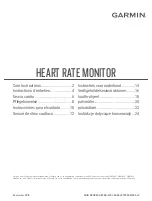
202P73/27
Highlights
CRT monitor
56 cm (22") real flat QXGA
Real flat CRT display
Philips advanced flat CRT technology reduces
glare and reflection more efficiently than a
conventional CRT. The special high-bright,
high-contrast shadow mask helps maintain
sharper focus and eliminates 'color blooming'
compared to standard tubes. It displays images
on a monitor that look like images on paper:
Viewing the image is more comfortable.
Straight lines are straight. Finding a reflection-
free viewing position is much easier. This adds
up to reduced eyestrain for a comfortable
viewing experience.
High-bright-high-contrast tube
A CRT tube designed to increase display
brightness and contrast by increasing the CRT
ray gun's beam current.
QXGA, 2048 x 1536 resolution
Quantum eXtended Graphics Array: A screen
resolution of 2048 x 1536 pixels.
Auto Calibrate
A one-touch system for maintaining optimal
CRT monitor performance by automatically
recalibrating color temperature to their
original values.
sRGB ready
sRGB is an industry standard that ensures the
best possible match between the colors
displayed on your screen and those in your
printouts.
Auto signal switch
The function determines signal type and routes
the signal to the proper channel.
Large viewing area
Viewing area is the visible portion of a monitor
screen available for displaying data.
Lead-free
Lead-free display products are designed and
produced in compliance with strict European
Community directives on Restriction of
Hazardous Substances (RoHS) standards that
restrict lead and other toxic substances that
can harm the environment.
Energy efficiency
Reduction of the electrical power required to
operate a device to achieve real savings.
TCO '03 compliance
A TCO (Swedish Confederation of
Professional Employees) standard even more
stringent than MPR-II for safety and
ergonomics, especially concerning alternating
electric fields (AEF).
Energy Star partner
A manufacturer in compliance with power
conservation requirements set forth by the
Environmental Protection Agency of the U.S.
government.





















